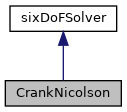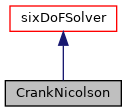Crank-Nicolson 2nd-order time-integrator for 6DoF solid-body motion. More...


Public Member Functions | |
| TypeName ("CrankNicolson") | |
| Runtime type information. More... | |
| CrankNicolson (const dictionary &dict, sixDoFRigidBodyMotion &body) | |
| Construct from a dictionary and the body. More... | |
| virtual | ~CrankNicolson () |
| Destructor. More... | |
| virtual void | solve (bool firstIter, const vector &fGlobal, const vector &tauGlobal, scalar deltaT, scalar deltaT0) |
| Drag coefficient. More... | |
 Public Member Functions inherited from sixDoFSolver Public Member Functions inherited from sixDoFSolver | |
| TypeName ("sixDoFSolver") | |
| Runtime type information. More... | |
| declareRunTimeSelectionTable (autoPtr, sixDoFSolver, dictionary,(const dictionary &dict, sixDoFRigidBodyMotion &body),(dict, body)) | |
| sixDoFSolver (sixDoFRigidBodyMotion &body) | |
| virtual | ~sixDoFSolver () |
| Destructor. More... | |
Additional Inherited Members | |
 Static Public Member Functions inherited from sixDoFSolver Static Public Member Functions inherited from sixDoFSolver | |
| static autoPtr< sixDoFSolver > | New (const dictionary &dict, sixDoFRigidBodyMotion &body) |
 Protected Member Functions inherited from sixDoFSolver Protected Member Functions inherited from sixDoFSolver | |
| point & | centreOfRotation () |
| Return the current centre of rotation. More... | |
| tensor & | Q () |
| Return the orientation. More... | |
| vector & | v () |
| Return non-const access to vector. More... | |
| vector & | a () |
| Return non-const access to acceleration. More... | |
| vector & | pi () |
| Return non-const access to angular momentum. More... | |
| vector & | tau () |
| Return non-const access to torque. More... | |
| const point & | centreOfRotation0 () const |
| Return the centre of rotation at previous time-step. More... | |
| const tensor & | Q0 () const |
| Return the orientation at previous time-step. More... | |
| const vector & | v0 () const |
| Return the velocity at previous time-step. More... | |
| const vector & | a0 () const |
| Return the acceleration at previous time-step. More... | |
| const vector & | pi0 () const |
| Return the angular momentum at previous time-step. More... | |
| const vector & | tau0 () const |
| Return the torque at previous time-step. More... | |
| scalar | aDamp () const |
| Acceleration damping coefficient (for steady-state simulations) More... | |
| tensor | tConstraints () const |
| Translational constraint tensor. More... | |
| tensor | rConstraints () const |
| Rotational constraint tensor. More... | |
| Tuple2< tensor, vector > | rotate (const tensor &Q0, const vector &pi, const scalar deltaT) const |
| Apply rotation tensors to Q0 for the given torque (pi) and deltaT. More... | |
| void | updateAcceleration (const vector &fGlobal, const vector &tauGlobal) |
| Update and relax accelerations from the force and torque. More... | |
 Protected Attributes inherited from sixDoFSolver Protected Attributes inherited from sixDoFSolver | |
| sixDoFRigidBodyMotion & | body_ |
| The rigid body. More... | |
Crank-Nicolson 2nd-order time-integrator for 6DoF solid-body motion.
The off-centering coefficients for acceleration (velocity integration) and velocity (position/orientation integration) may be specified but default values of 0.5 for each are used if they are not specified. With the default off-centering this scheme is equivalent to the Newmark scheme with default coefficients.
Example specification in dynamicMeshDict:
solver
{
type CrankNicolson;
aoc 0.5; // Acceleration off-centering coefficient
voc 0.5; // Velocity off-centering coefficient
}
Definition at line 69 of file CrankNicolson.H.
| CrankNicolson | ( | const dictionary & | dict, |
| sixDoFRigidBodyMotion & | body | ||
| ) |
Construct from a dictionary and the body.
Definition at line 43 of file CrankNicolson.C.
|
virtual |
Destructor.
Definition at line 57 of file CrankNicolson.C.
| TypeName | ( | "CrankNicolson" | ) |
Runtime type information.
|
virtual |
Drag coefficient.
Implements sixDoFSolver.
Definition at line 63 of file CrankNicolson.C.
References Foam::constant::atomic::a0, Foam::constant::mathematical::pi(), Foam::tracking::rotate(), and tau.
